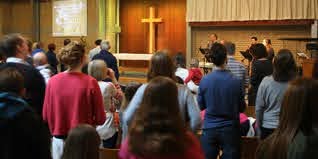
Undeniably, there is a massive rate of apostasy in the west, and many are asking why. There is no single answer. Many Christian thinkers put the issue on weak teaching, others and poor discipleship. Sadly, others are persuaded that Christianity needs an update; adapt to the modern culture; embrace modern values and get with the times. All of these answers have varying degrees of merit. However, I want to highlight a nuance to the answer around discipleship, which seems to blindside fellowships.
We are doing Church wrong! I want to be clear about what I mean by this phrase. The ‘Church’ referenced here is the body of Christ, the people of GOD, the collective of believers, the disciples of Christ seen as a whole. By ‘doing’ I mean by how we construct the collective experience.
Let’s unpack this a little. When we think of the modern western Church, most of us think of a church that meets on a Sunday for a gathering, in which we hope for inspirational teaching and worship. This is followed by fellowship with people who love the Lord every bit as much as we do, who genuinely care for us, are interested in who we are, and what we are about. We hope that our fellowships will have midweek activities; Bible studies, home groups, and church-based socials, where we can have fun together in a godly manner. To be fair, the vast majority of Christian fellowships can’t even achieve this much! However, just think of what I have described – is it a roughly fair estimate of your fellowship? Well, what I have described is a club! I mean, golf clubs, gyms, and political clubs all operate like this as well. Is that really a New Covenant community, a holy nation, a royal priesthood, a people set apart?
Again, we are doing Church wrong! The Christian community is supposed to be a ‘new people group,’ a new ‘ethnos,’ a new identity, not a Sunday club with optional extras for mid-week. It is supposed to be a new identity. This leads to the question of how an identity formed.
However, before we get there, I don’t want you to read this and think you must recoil from Sunday gatherings and the Sunday club model of ‘doing’ church as if it is some kind of heresy or grievous error. It’s actually more of an echo from when the whole of society was Christian, down to our collective toes and to the top of our heads; when everything around us paid deference to a Christian civilisation. In this context, Sunday fellowships that amounted to clubs made sense. As you did most of your Christian living at home amongst your family, the institutional church structure restricted itself to the ritualistic and sacramental aspects; gathering society together on Sundays to celebrate the resurrection and other festivals of the faith as was one of the common binds of society. The move into a Sunday club came in the wake of this slow decline of Christianity in society. Thus, the ‘church Sunday club’ has become the halfway house between an alternate society and what was the former civic religion of the whole of Christendom.
However, the problem with this is that society has been increasingly playing to another tune since the late 1700s. Christians, therefore, are being socialised by the culture around them as they interact with work colleagues, watch TV, listen to music, are exposed to advertising. They are being formed and discipled by non-Christian world views in their understanding of history, values, and doctrines. Then, they go to church on Sunday and, if they are lucky enough, receive a great sermon that builds them up in the faith. However, most of their ‘discipleship’ is done in the world, not in the Church, because the Church is run like a Sunday club with activities. We even use this club-like-church evangelistically, as a way to attract people to join the church. Again, nothing is wrong with it in and of itself. However, fundamentally this is not working!
How do I know? Merely because of the huge numbers of Christians who lose their faith; and simply go on to join other clubs with other interests (and I am not speaking of other religions here). Most apostasy is toward unbelief. However, another sign that socialising/discipleship is going the wrong way is in how many Christian organisations (even entire sections of institutional churches) de-Christianise. We see it in the Methodist Church, Church of Scotland, huge sections of the Church of England, and parts of the Episcopalian and Roman Churches in America. They teach modern values and beliefs coated with Christian language and smuggled into Christian festivals, such as celebrations of transgenderism, acceptance of abortion, and being concerned with religious plurality and multiculturalism. Why is this happening? Because people are socialised by their interactions within society far more than their interactions in church. One of the principled reasons for this is simply a question of time. More time is spent out of the fellowships, surrounded by non-Christians, rather than in them, surrounded by Christians who hopefully know who they are, which is a Christian.
Most Sunday club fellowships are manned by stoic volunteers and a few staff who put on all the activities of the club for the rest of their members. If you are one of those people, I salute you. Some clubs do it well, most do it mediocre, and for a few, it’s a shambles (those fellowships usually fail and close). So, how can we move from where we are to something approximating where we should be?
We need to consolidate Christians of all denominations, seeing ourselves as a single people (with our differences, but as one group). We then need to start coalescing into Christian areas, packing ourselves in as it were, that we come to be the prevalent group. We need to share our buildings with one another – we have too many as it is. I am talking in terms of joint ownership and responsibility, even if the fellowships’ worship at different times and ways in that shared building.
We need to rediscover in these collectives an ecumenism; a sense of solidarity with one another, a way to live side by side and, at the very least, be accepting of the differences between us. However, this needs to be connected to a rediscovery and appreciation of our joint history as Christians, or the history of the Christian movement, and an ability to build an identity on that. We have to connect this with public expressions of our faith; the vibrant, confident practice of our faith amongst ourselves, and to live this out culturally. For instance, as one of these collectives develop and begins to take over the economy of the local area, those shops close on Sundays. In other words, we express our faith politically, expecting the local police to respect our Christian sensitivities in the way they go about their policing (e.g., removing their hats in Church as a small example of what I mean). We need to affirm our common faith as encapsulated in the ancient and shared creeds of the Church, emphasising what is common between us. We need to expect the local economy to bend itself to this new majority by, for instance, respecting the fasting customs of Lent and Advent – by putting on Vegan dishes during these periods.
We need to combine this with two other key components: The first is a fierce missionary zeal and desire to go out and convert others and bring them into the community. The second is the ability to facilitate our own security, and as such our fellowships need to take martial training seriously. By doing so, it will become a known thing that the Christians can defend themselves if they need to. No one should challenge the Christian community thinking that we are pushovers.
To some degree, this alternative model of collectivisation has been tried already and demonstrated great promise. Think of the Amish or the Brudahof, but more pumped up and out-wood looking. There have already been attempts at setting up communes such as Jesus Army, which failed because it spread out and did not have sufficient mass in one place to start drawing people in. The reason why the Amish and Brudahof are not more successful is that they essentially are not missionary minded. They expect you to stumble onto them rather than going out and aggressively evangelising. Monastic orders were much more successful in the past, but they were made up of some hardcore committed Christians who, for most of their history, did operate within wider Christian society.
The Church needs to move from the ‘Sunday club church’ model to doing church as a mini-society, expressing a distinctive, Christian identity through its culture, its values, its beliefs, and its sense of history. A kind of Amish-style collective (perhaps minus the attachment to 1700s tech – so like the Brudahof then), but one that is much more mission-minded, and can go toe-to-toe with any other group when push-comes-to-shove, constantly seeking to grow by a repetition of consolidation and expansion.

